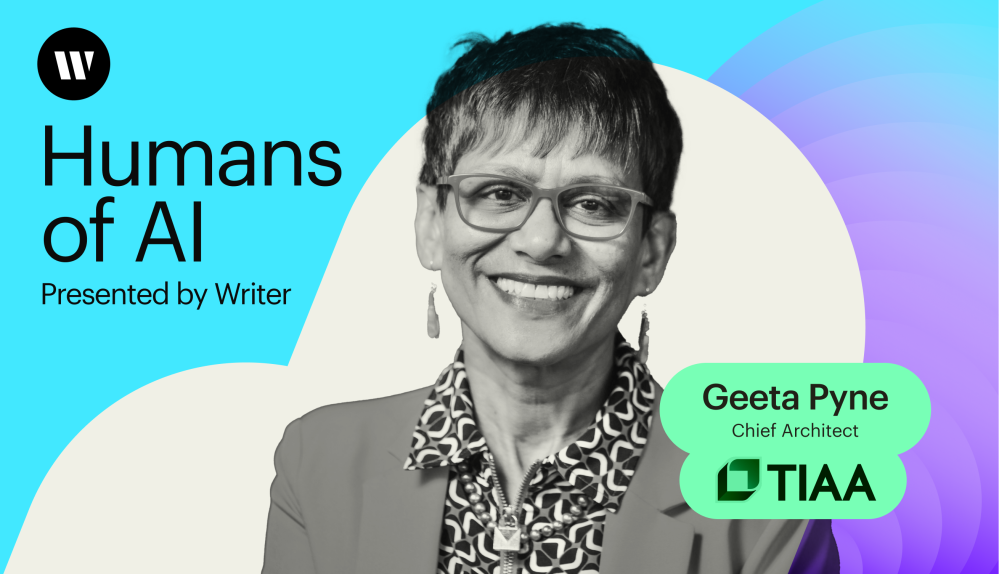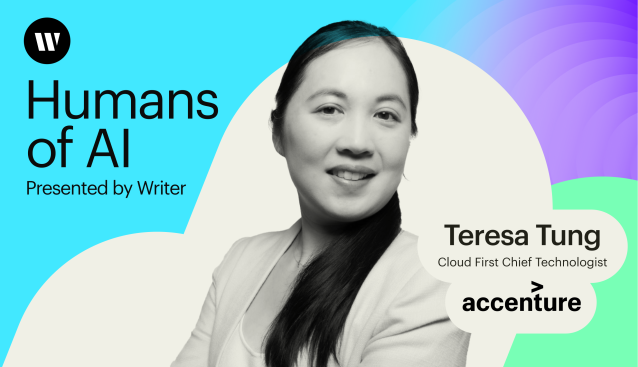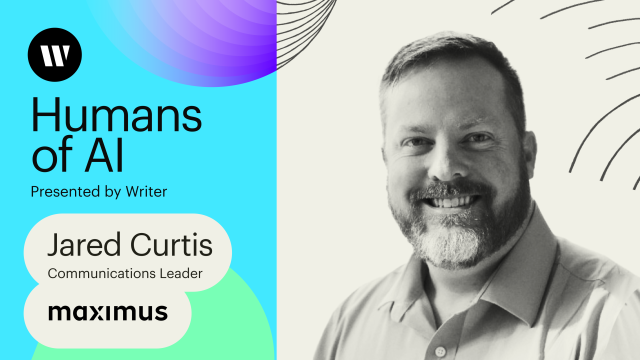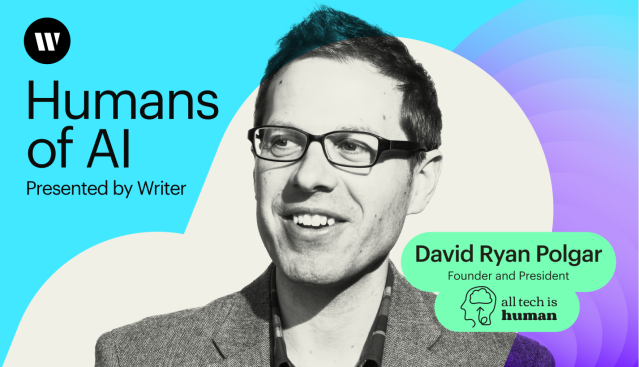Humans in the loop
– 8 min read
TIAA’s Geeta Pyne on enterprise architecture and the art of possibilities

Given the rapid rate AI technology is evolving, the possibilities seem endless for enterprise companies. Looking at the pragmatic implementation of generative AI requires a delicate balance of innovation, responsibility, and a deep understanding of the human impact.
In this episode of Humans of AI, we’re thrilled to speak with Geeta Pyne, an enterprise architect who focuses on ensuring that AI usage aligns with her organization’s long-term goals and values. She’s held key positions at renowned organizations such as ISRO, VMware, Zuora, and Intuit during her impressive 30-plus-year career. Now she serves as the Chief Architect at TIAA, where her expertise lies in bridging the gap between business strategy and technology execution.
Join us as we explore Geeta’s insights on enterprise architecture and her vision for utilizing data and AI to create a better future. Discover how her unique perspective is shaping the field of enterprise architecture and driving meaningful outcomes in the world of technology and AI adoption.
- Geeta discusses the crucial role enterprise architects play in aligning business strategy and technology strategy.
- She emphasizes the importance of a team approach and humility, as learned from her early work at ISRO.
- Embracing change, being bold, and being proactive is needed when shaping the future with technologies like AI.
- Geeta also warns about the risk of implementing technology for its own sake without aligning it with the organization’s strategy.
Geeta’s view on the art of possibilities
What sets Geeta apart isn’t just her extensive experience and technical prowess. It’s her unique perspective on the art of possibilities and the role of data in driving meaningful outcomes.
Geeta’s approach to enterprise architecture is grounded in her belief that nothing is impossible. She sees the art of possibilities as a way of looking at life — combining optimism, positivity, and a determination to get things done. As an enterprise architect, her role is to ensure that business strategies are translated into actionable plans, avoiding the pitfalls of aimless construction, much like the infamous Winchester House.
Throughout her career, Geeta has witnessed the transformative power of data and the current role it plays in AI-driven solutions. With her expertise in enterprise architecture, Geeta understands the importance of processing data efficiently and using it to drive positive change in the world. She also emphasizes the need for sustainability in architecture, ensuring responsible practices and minimizing waste.
The role of an enterprise architect
Enterprise architects serve as the vital link between business strategy and technology execution — they’re the unicorns of the corporate world. Instead of focusing solely on the technical aspects, Geeta emphasizes the importance of them understanding and aligning with business goals, thus producing a more holistic and effective strategy.
“They should have enough technical depth and breadth to be able to say, ‘I can understand how to do data, how to do infrastructure, how to do security,’” says Geeta. “On the other side, they should be very articulate and understand the business aspect of it because enterprise architects are truly strategy to execution.”
Their primary role is to transform business strategy into actionable plans, ensuring that the organization’s goals are translated into a clear and achievable path. Geeta stresses the importance of creating a path that leads to the ultimate outcome, rather than a stairway going nowhere.
As Geeta puts it, “Our role is really how do we make companies have business strategy, technology strategy. How do you make that strategy real? How do you execute on that strategy? That’s what the enterprise architect is thinking about, making sure the strategy you’re talking about creates that North Star and a path to reach that ultimate outcome.”
The need for curiosity, collaboration, and limitless possibilities
Geeta’s career journey started at ISRO — the Indian equivalent of NASA — where she took a job as an engineer. That early experience was formative in how she approaches work as an enterprise architect.
“I would say my experience, if I summarize that first principle thinking, it’s go back to the basics. Challenge every assumption. And if something seems too complex, you’re not thinking right,” she explains. “So break down and break down and break down to get it into bite size chunks.”
Geeta also speaks to the importance of teamwork and staying humble: “It’s always a team sport. No individual contributor, one person cannot do everything. The more you know, the more you know that. How little you know, right? When you can surround yourself with the right set of people, you just feel like you are part of the ecosystem.”
The ideology of “nothing is impossible” that Geeta embraces is precisely what companies need to initiate progress. It’s also the solution for ensuring ethical integration of AI in the future.
“To me, the art of possibilities is how I look into life, right? I’m a natural, optimistic, positive person. And also I’m like, you know, ‘get shit done.’ Like, you know, don’t just talk about it.”
Pragmatic AI adoption
Geeta’s current role as the Chief Architect at TIAA presents a unique set of challenges and opportunities. TIAA — a legacy company with over a hundred years of history — operates in a highly regulated industry. This context influences Geeta’s approach to implementing AI initiatives within the organization.
“We are experimenting, but in a pragmatic way,” she explains. “We want to innovate with AI and generative AI, but also be very mindful so that we don’t do anything silly or stupid.”
As a legacy company, TIAA has established systems, processes, and a loyal customer base. This necessitates a thoughtful integration of AI solutions that align with the organization’s values and long-term strategy. Geeta’s role as the Chief Architect is to ensure that AI initiatives at TIAA are driven by tangible business and customer value.
“Ultimately you have data and metadata that are connected and now you can apply AI in all senses,” she explains. “But at the end of the day, what am I feeding it? I’m still feeding it data. The data could be coming from a vector database or from a relational database. That’s why I think data is still the center. But what it’s forcing is also the question, ‘Is the data technology going to be enough?’ Because if it isn’t driving any business value, if it’s not driving any customer value, it’s just technology for technology sake.”
She doesn’t do this work by herself. Geeta works alongside a team of data scientists, AI architects, and data architects. Her greatest strength is her ability to take a holistic approach when viewing things.
“I’m not the smartest person at all. But what I see is the white spaces. I can connect the things together. I can feel things that we might not be thinking about.”
Data quality and sustainability in AI
Resources are finite, meaning architects need to find the most efficient way to use technology while minimizing waste. Data quality and sustainability are critical considerations when innovating with AI initiatives. Architects, like Geeta, play a vital role in guiding organizations towards sustainable AI practices.
She poses the questions: “What is the place for generative AI versus what is it not? And also, what does it do? How does it align with your future strategy?”
Optimistically, Geeta hopes that data quality and data governance will become first-class citizens in the future. This is only possible with architects and CTOs keeping tabs on experimentation and reducing waste while simultaneously allowing for organizational evolution. It’s a delicate balance, she admits.
“With data, you can now see basically every composition that you are building,” Geeta says. “Before you actually go into the whole manufacturing process, you can analyze the ingredients. You can see what the composition is, and is it actually good for the earth or good for the environment or good for the people?”
Geeta’s insights serve as a call to action for us all to be more mindful and responsible when implementing AI technologies. The future of AI shouldn’t just focus on technology for technology’s sake, but also consider its impact on people and the environment.
When discussing AI, we often speak about getting in on the ground floor of an opportunity to build a better career, or a better business, or a better future. We’re getting ahead of ourselves with this mindset.
To build something that lasts, we first need architects like Geeta, who can make sense of data to drive the outcomes we want for the world.
Want to hear more stories from the humans working at the crossroads of business and generative AI? Subscribe to Humans of AI wherever you listen to podcasts.


